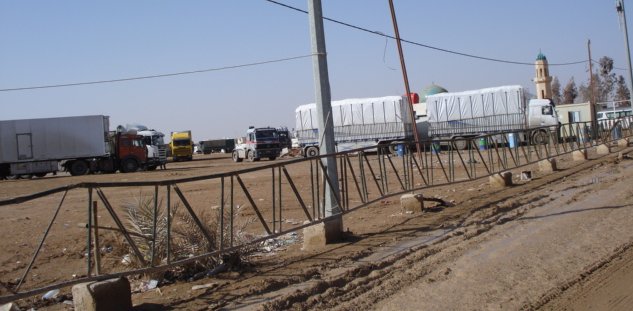Some bandits robbed a train last week. I thought that only happened in “Butch Cassidy and the Sundance Kid” days. Unfortunately in this case no horsemen came galloping out of a boxcar to chase the miscreants. They got away with some oil bound for the refinery at K3. I really don’t know any details of the circumstance. It was probably just an inside job and a lot less picturesque than I imagine it. But I have been learning a little re the transportation network in Iraq.
Iraq has the biggest rail network in the Middle East. Rail lines reach from beyond Mosul in the north, west to Al Qaim and south to the Persian Gulf. During the early 20th Century, the Berlin to Baghdad railroad line (part of which was the famous Orient Express) was an irritant in German-British relationship, as the Brits thought the Kaiser in league with the Turkish Sultan, who controlled Mesopotamia, would use the rail network to threaten access to their colony in India. Iraq was in the middle of things then and geography has not changed.
In a reasonably peaceful Middle East, Iraq will serve as a gateway from east to west, north to south. I am told that container ships could offload their cargos in the Eastern Med ports onto railroad cars, which could then go overland through Iraq to the Persian Gulf where they could either serf local markets or be transshipped. Goods could also go the other directions. It would cut shipping time by about a week over going through the Suez Canal and save millions per shipment. Containerization of cargo makes this a profitable venture.
The Iraqis recently ran their first passenger train from Baghdad to Basra. This is more of a political than an economic endeavor. Passenger rail loses money. This trip to Basra cost around $6000 more than it made in revenue, even fully loaded. I personally love passenger rail, but the economics are tough.
Tougher than passenger rail are prestige airports. Iraq has lots of airports. Saddam Hussein built them for his vast air force, which he never used. Some people say that they should be converted to civilian use. The is easier said than done, or put correctly cheaper said than done. Most big passenger airports also lose money.
In the case of both rail and air, the freight tends to make money and the passengers lose money. It is not widely appreciated that the U.S. has one of the best rail systems in the world. I found an interesting webpage re. It is overlooked because ours is mostly a freight rail system. The Europeans move people; we move goods. One is easier to see than the other, but the efficacy of our rail system is reflected in the less expensive goods we can get.

Away from the ocean or big rivers, what doesn’t move by rail usually moves by road. It is best to take as many trucks as possible off the road, by putting their loads on rail. I prefer to ride my bike or take a train, but I know that most people prefer to drive. If the choice is between taking the passenger car or the big truck off the road, I think taking the truck off is the obvious choice.
The realization that container cargo could be sent throught Iraq like this was a surprise to me, a paradigm shift. Ferdinand de Lesseps would also be surprised and perhaps a little chagrined that his great creation was being outclassed by something as mundane as freight rail. Maybe they should play the chorus from Aida as they load the first rail cars.
